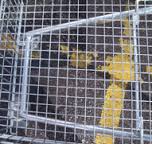Abandoned supermarket trollies are ‘blighting’ the nation’s streets and waterways, claims the Local Government Association (LGA). The body representing councils in England and Wales warns that the number of dumped trolleys is running at over 1.5 million a year. Councils say many trolleys end up in rivers and canals and councils are being forced to stem floods and remove blockages.
The LGA is calling for supermarkets to work with councils to combat the trolley thieves and tackle the issue at source. It is also urging the chains to consider introducing ways in their stores to make it harder to steal trolleys: such as bollards and security gates; more CCTV in store premises; awareness campaigns; and more wheel-locking devices as used by some chains which activate when trolleys are taken beyond supermarket perimeters. Councils can try and claim the costs of removal, storage and disposal of abandoned carts from trolley owners. However, it is time-consuming and bureaucratic. The LGA wants the system to be streamlined for councils to get compensation. The best solution, however, the LGA repeats would be if supermarkets stopped the problem at source.
Besides dumped trolleys and irresponsible fly-tipping being an eyesore, Government figures released on October 20 suggested fly-tipping has increased for the second year running and the clear-up cost is nearly £50m. Councils also want manufacturers and supermarkets to contribute more to the cost of clearing up fly-tipping and litter generally.
Peter Box, the LGA’s Environment spokesman, said: “Supermarkets need to slam the brakes on trolley thefts because the country is becoming blighted with abandoned carts. Councils, who are doing everything they can to tackle this burgeoning blight, are being left with a major clear-up bill. We want to see the supermarket giants step up their game and show real leadership over this issue.
“At a time when councils face difficult choices about services in the light of reducing budgets, they are having to spend millions each year on tackling litter and fly-tipping, including abandoned shopping trolleys. This is money that would be better spent on vital front line services. Litter and fly-tipping is environmental vandalism – it’s unpleasant, unnecessary and unacceptable.
“There are a number of changes that would help tackle littering and fly-tipping, including sharing more of the responsibility with product producers – such as retailers and manufacturers – to contribute to the costs of clear up, and giving councils more effective powers to deter fly-tippers.”
Stats
In 2014-5 councils counted some 900,000 fly-tipping incidents. Household waste and then commercial waste are the main types contributing to fly-tipping. The most common place for fly-tipping to occur was on highways which accounted for near half, 48 per cent of total incidents in 2014-15. And fly-tipping on footpaths, bridleways and back alleyways rose by 3.2 per cent in England in 2014-5, to together account for 28 per cent of fly-tipping incidents.
Local authorities carried out nearly 515,000 ‘enforcement actions’ at an estimated cost of £17.6m in 2014-15. Councils carried out 1,810 prosecutions for fly-tipping offences in England in 2014-15, down by 9.6 per cent from 2,002 the year before. By contrast councils issued far more warning letters – over 75,000 – and 38,000 statutory notices in 2014-15.
For the 2014-15 fly-tipping figures visit https://www.gov.uk/government/statistics/fly-tipping-in-england.










